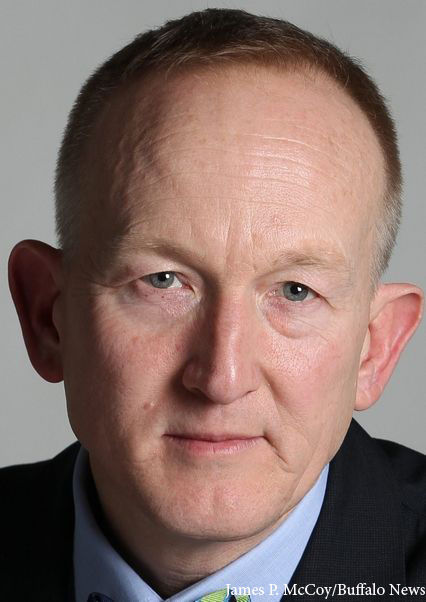By Mark Sommer
Buffalo News, Jan. 17, 2013
Single-payer health care remains the only way to meet public health needs, and demand for it will reignite as changes brought by the Affordable Care Act fail to make health care cheaper and continue to leave tens of millions uninsured, the head of a national physicians organization said Thursday.
Dr. Andy Coates, president of Physicians for a National Health Program, which represents more than 18,000 members, spoke to The Buffalo News Editorial Board. He later spoke at a forum sponsored by Partnership for the Public Good.
Coates, who practices in a community hospital in Albany and teaches in the departments of medicine and psychiatry at the University at Albany, said he constantly sees rising premiums and deductibles force low-income patients to choose between critical health needs and basic survival.
“I had a man [recently] who bled half of his blood volume, and he insisted on discharge because he had a day-by-day hospital co-pay of over $200, had no savings and hadn’t been able to pay his bills because it hadn’t snowed enough to plow snow like he usually does. He just absolutely insisted on going home when our advice was that he should be in a hospital making sure he didn’t continue to bleed,” Coates said.
“This kind of thing is unbelievably common.”
He predicted changes under way in health care will fall far short.
“The data we’ve seen most recently suggests that even in 2019, with the [Affordable Care Act] fully implemented, there would still be 36 million people without health insurance. It’s not fundamental reform, and the proven cost savings are none.”
Coates, who compared doctors to “lawyers for the poor,” said the country eventually will have to turn to single payer because “nothing else will work.”
He said studies and polls have shown a majority of the public and physicians would support single payer, but the idea remains outside mainstream acceptability among the political class.
He also promotes a more holistic approach to health care and was joined by Dr. Kathleen Grimm and Jessica Bauer Walker of the Community Health Worker Network of Buffalo.
Members of the 2-year-old network of health care and public health advocates operate as community educators and organizers who, through social networks, help people underserved by traditional health systems.
“Our way of working is based on trust, which is a very different framework for those who are providing and receiving services,” said Walker, the group’s executive director.
Grimm, co-chairwoman of the health network, noted the U.S. ranked 17th in a 2007 study by the Institute of Medicine and the National Research Council of life expectancy among high-income countries.
“The one distinguishing factor is that the United States does not have universal health coverage,” Grimm said, “and the other 16 do.”
Mark Sommer is a Buffalo News staff reporter.
http://www.buffalonews.com/apps/pbcs.dll/article?AID=/20130117/CITYANDREGION/130119215